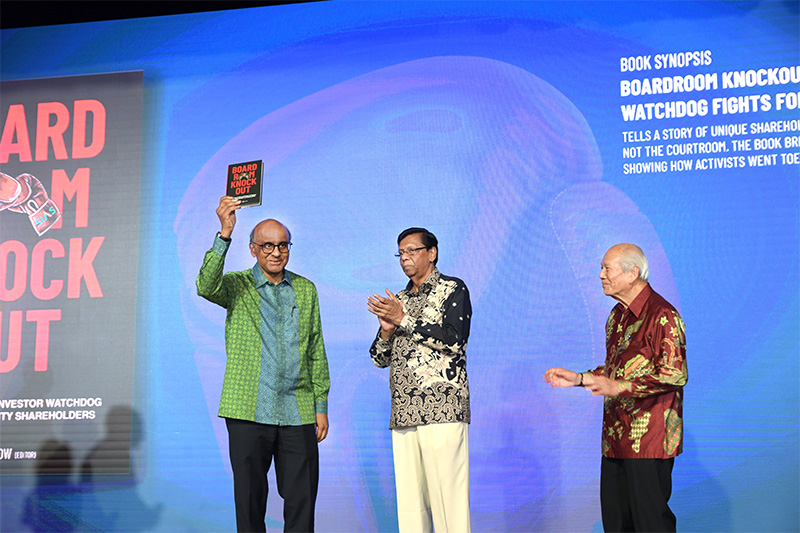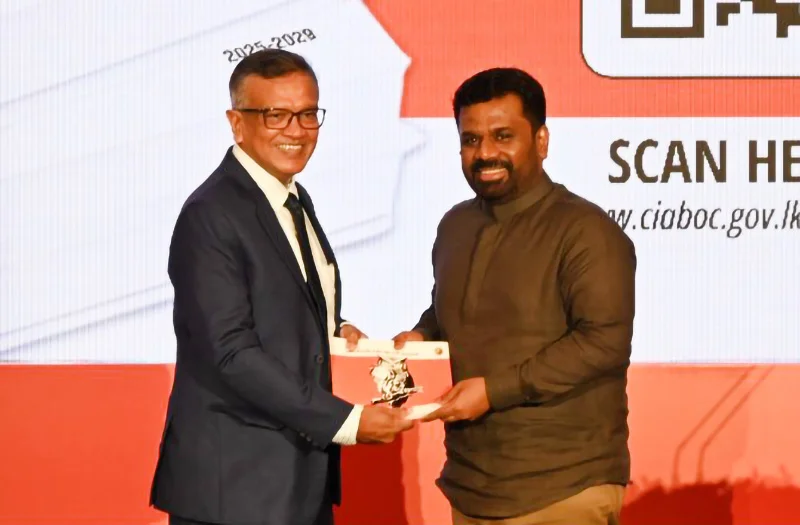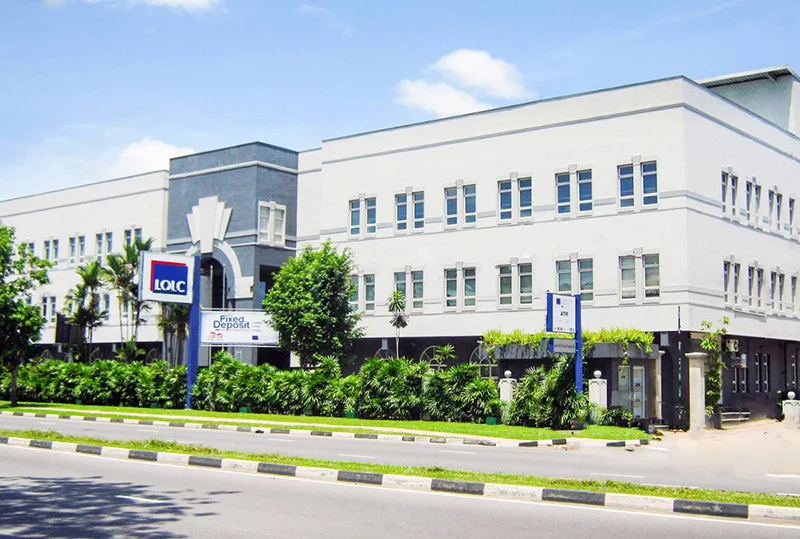Business
‘Boardroom Knockout’: How Singapore’s investor watchdog fights for minority shareholders

By Ifham Nizam
The story of David Gerald and the work he has done for minority investors has been nothing short of extraordinary. Here is a man who had no experience in investing, or in stock markets, but was willing to risk his reputation to stand up against the Malaysian government, internationally known author, Aaron Low said. The author of a landmark book titled, ‘Boardroom Knockout’, featuring share market issues, Low spoke to The Island Financial Review recently in an exclusive interview.
Extracts from the interview:
Q: What inspired you to tell the story of David Gerald’s early experiences centering on injustice in Ceylon and on how they shaped his career and mission?
A: The reason why he did so is simple: justice. When the Malaysian government shut down the Central Limit Order, a system that facilitated the trading of Malaysian shares by Singaporean investors, more than 172,000 investors in Singapore found their funds locked up and frozen in a foreign land. The total? More than S$7 billion.
I asked him why he would even contemplate such a move. After all, he was already in his 50s and approaching what would be the prime of his career as a litigator. He told me that he has always been inspired by a sense of justice. When he was a boy growing up in Ceylon, he saw a group of soldiers brutally assaulting a young man, who was also deaf and mute. Shocked, Gerald wanted to do something for the youth but was frozen by fear. That, he said, was a turning point and he swore he would not let anyone down again – even if that meant taking on a foreign government.
Q: How did David Gerald’s legal work under Singapore’s celebrated criminal lawyer, David Marshall, influence his later advocacy for small investors?
A: If the incident with the youth in Ceylon sparked his desire to pursue justice, his work with David Marshall brought the fight for justice to life. Marshall was Gerald’s mentor and the epitome of what it was to be a criminal justice lawyer. His passion for legal work and commitment to his clients inspired Gerald to do the same.
You can see this in the work he does at SIAS – all of it is geared towards helping the mom and pop investors, who are not the most sophisticated of stock market players.
Q: The founding of SIAS in 1999 was a pivotal moment for small investors in Singapore. What were the biggest challenges SIAS faced when tackling the CLOB issue with Malaysia?
A: The biggest issue that SIAS faced was that they couldn’t even get the Malaysian government to engage them! I mean, it’s not surprising right? Why would the federal government of Malaysia want to even pay attention to a small group of amateurs?
So the first thing that SIAS needed to do was to get recognition that it was a serious player that represented the aggrieved investors. Gerald knew this, which was why one of the first things he did was to get thousands of people to sign up as SIAS investors.
The second big challenge was that the issue was toxic cocktail of tense history between Singapore and Malaysia as well as anti-foreigner sentiments, in the aftermath of the Asian Financial Crisis.
Q: Could you elaborate on SIAS’s approach to resolving corporate governance issues, especially its preference for negotiation over litigation?
A: SIAS has become such an important institution in Singapore’s corporate landscape. Let me put it this way: Asians hate public confrontation. Losing face is as bad as losing money – and in an ugly public fight, chances are both parties will lose both.
Instead, perhaps inspired by consultative communalism, SIAS has decided to go with a “let’s talk about it” approach. Part of the reason why it did so was simply the recognition that SIAS was never going to be so well-resourced to take on corporations that had hundreds of millions of dollars in its bank accounts to fight off lawsuits.
Another, and arguably, more important reason, is that seeking consensus has the highest probability of achieving something when nothing else works. The truth is that angry minority investors turning up at corporate annual general meetings is a common sight. But it is also common that these same investors hardly get anything for their troubles, except maybe that they feel good for a few minutes venting their frustrations in the open.
SIAS prefers to work with companies behind closed doors, over tea and not threats, to resolve issues amicably. SIAS can do so because it carries the weight of thousands of minority shareholders with them; companies also much prefer talking to a rational party rather than emotional angry individuals. This way, the hope is that a compromise may be met. Maybe the company won’t pay the book value of $10 for a company but it is willing to up its price to $7.50 from $5 if SIAS can broker a deal with investors.
I think corporates like to deal with them, while minority investors trust SIAS. This balance is not an easy one to achieve and it took SIAS many years before it could find its equilibrium.
Q: What lessons can today’s corporate leaders and investors learn from SIAS’s unique approach to resolving conflicts outside courtrooms?
A: That life is nothing but a series of compromises because we are all deeply flawed in one way or another. No one is perfect and even good people do bad things in a time of weakness and temptation.
So instead of judging, approach each situation with empathy, honesty and truth. It’s a high ideal but sometimes laying all your chips on the table is the best way to resolve the worst of conflicts.
Business
National Anti-Corruption Action Plan launched with focus on economic recovery

In a decisive move to stabilize Sri Lanka’s economy and rebuild investor confidence, the Commission to Investigate Allegations of Bribery and Corruption (CIABOC) yesterday launched the National Anti-Corruption Action Plan (NACAP) 2025–2029, with a clear focus on promoting transparency, accountability and economic governance.
Developed with the support of the United Nations Development Programme (UNDP) and funded by the government of Japan—contributing nearly USD 900,000—the initiative aims to address corruption as a critical economic barrier.
The launch, attended by President Anura Kumara Dissanayake, Chief Justice Murudu Fernando PC, and high-level diplomatic and institutional representatives, signals a shift in Sri Lanka’s economic reform narrative. The NACAP is seen not just as a governance tool but as an economic recovery strategy designed to attract foreign investment, improve public finance management and rebuild public trust.
R.S.A. Dissanayake, Director General of CIABOC, noted that corruption, “is more than a legal issue—it is an economic cancer that stifles innovation, distorts markets and deters foreign direct investment.” The establishment of Internal Affairs Units (IAUs) within government institutions is expected to bring internal oversight to public spending and performance, improving the efficiency of state services.
Japanese ambassador Akio Isomata stressed that eliminating corruption is essential for Sri Lanka to regain global investor confidence. “Transparency and good governance are fundamental pillars for sustainable economic development, he said. “For Sri Lanka to attract foreign investment and achieve long-term growth, the effective implementation of this Action Plan is crucial.”
Echoing this, UNDP Resident Representative Azusa Kubota highlighted the importance of aligning governance with economic goals. “The NACAP is a roadmap for transforming Sri Lanka’s economic governance, she said. “It will make corruption visible, measurable, and actionable.”
The NACAP is built on four strategic pillars—Preventive Measures, Institutional Strengthening & Enforcement, Education, and Law & Policy Reform—targeting nine priority areas. These include streamlining state enterprise management, modernizing financial crimes investigation and integrating anti-corruption education into economic policymaking.
The implementation timeline is designed with a phased approach: short-term stabilization, medium-term reform and long-term transformation—ensuring consistent progress toward a more accountable and economically resilient state.
“Corruption ends here. The responsibility of eradicating bribery and corruption will not be passed on to the next generation — it will be resolved by our government today, President Anura Kumara Dissanayake said.
The President stressed it marks a turning point in Sri Lanka’s history. “With the launch of the National Anti-Corruption Action Plan 2025–2029, we are drawing a bold line in the sand. No longer will the fight against corruption be tangled in politics or postponed for the future. Public officials now have six months to bring transparency and integrity to their institutions. After May, the law will act decisively and without exception. This is not just policy — it’s a promise. A new era of accountability has begun and it begins with us.”
By Ifham Nizam
Business
Verdant Capital doubles down: $13.5m now powering LOLC Africa’s MSME expansion

Verdant Capital invests $4.5M more in LOLC Africa, expanding MSME lending across 10 countries and deepening financial inclusion efforts continent-wide.
Verdant Capital has announced that its Verdant Capital Hybrid Fund (the “Fund”) has completed an additional investment of USD 4.5 million in LOLC Africa Singapore Limited (“LOLC Africa”). This investment brings the total investment in LOLC Africa to USD 13.5 million. This follows the initial investment of USD 9 million in LOLC Africa, completed in June 2023. Both investments are structured as holding company loans, and they are being directed towards LOLC Africa’s operating lending subsidiaries in Zambia, Rwanda, Egypt, Kenya, Tanzania, Nigeria, Malawi, Zimbabwe, Ghana, and the Democratic Republic of Congo.
Founded in 1980 in Sri Lanka, LOLC entered the African continent in 2018. Verdant Capital Hybrid Fund is the first external investor in LOLC Africa’s operations, reflecting the Fund’s catalytic investment approach. These investments are driving the expansion of LOLC Africa’s micro, small and medium enterprises (MSMEs) financing footprint across the continent. Additionally, the Fund’s Technical Assistance Facility (TAF), has offered financial support for LOLC Africa’s Social Ratings and Client Protection Pre-Certifications for its subsidiaries in Zambia and Egypt, with further Technical Assistance initiatives in the pipeline.
Business
HNBA’s advisor & partnership channels drive 26% growth

HNB Assurance PLC (HNBA) delivered another year of outstanding financial performance, securing a 7.5% market share and moving a step closer to achieving its ambitious target of 10% market share by 2026. This success was a result of the company’s well-structured strategies, focused on sustainable growth in an increasingly competitive landscape, which yielded impressive results, with its Gross Written Premium (GWP) growing by 26% compared to the previous year.
Over the past four years, HNBA has maintained an average growth rate of 26%, consistently outperforming the industry. A key element of HNBA’s approach has been prioritizing distinctive, value-driven products over high-volume, lower-margin offerings. This strategy has allowed the company to cater to a broader customer base, ensuring inclusivity while maintaining the competitiveness and relevance of its product portfolio
In terms of growth, HNBA’s proactive investment strategy resulted in an 8% growth in investment income, reaching Rs. 6.9 Bn, while Funds Under Management saw a 26% increase. HNBA paid net benefits and claims totaling Rs. 2.9 Bn. The total assets of the company expanded by 24% to Rs. 53.4 Bn, primarily driven by increased financial investments. Additionally, total Life Insurance contract liabilities grew by 25% to Rs. 38.6 Bn, following a surplus transfer of Rs. 1.3 Bn to shareholders.
-

 Business4 days ago
Business4 days agoColombo Coffee wins coveted management awards
-

 Business6 days ago
Business6 days agoDaraz Sri Lanka ushers in the New Year with 4.4 Avurudu Wasi Pro Max – Sri Lanka’s biggest online Avurudu sale
-

 Features5 days ago
Features5 days agoStarlink in the Global South
-

 Business7 days ago
Business7 days agoStrengthening SDG integration into provincial planning and development process
-

 Business6 days ago
Business6 days agoNew SL Sovereign Bonds win foreign investor confidence
-

 Features2 days ago
Features2 days agoSri Lanka’s Foreign Policy amid Geopolitical Transformations: 1990-2024 – Part III
-

 Features5 days ago
Features5 days agoModi’s Sri Lanka Sojourn
-

 Midweek Review2 days ago
Midweek Review2 days agoInequality is killing the Middle Class











